
XXV
SEOULITE CONTRIBUTORS 2022
Editors-in-Chief
Aimee Choi, Rosa Suh
Managing Editors
Clair Kang, Grace Lee
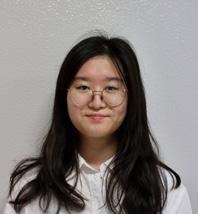

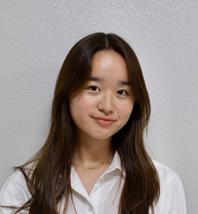
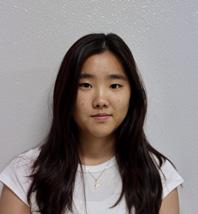
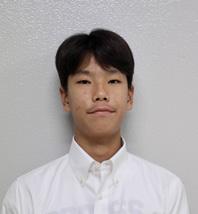


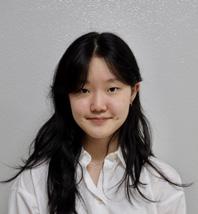

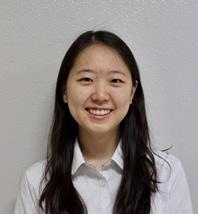


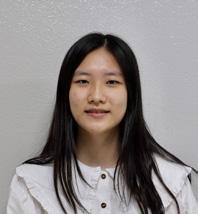
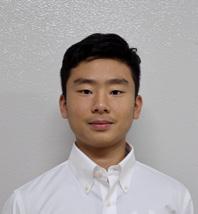

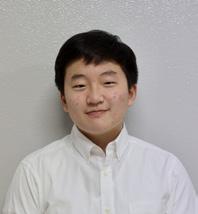
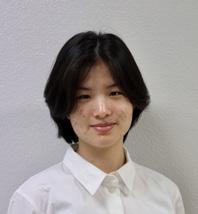
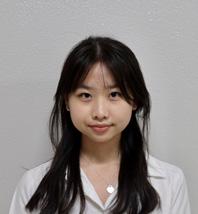

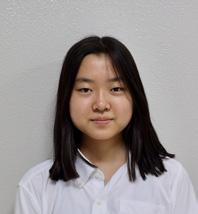

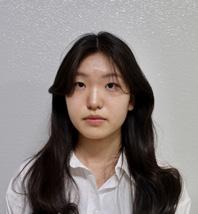
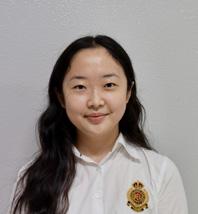
Copy Editors
Lauren Kim, Chelsea Kim
Layout Editors
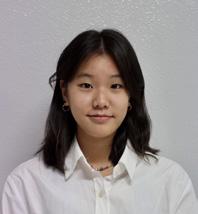

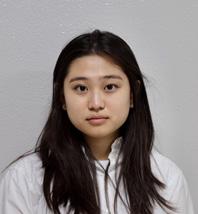
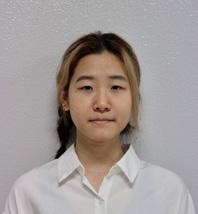
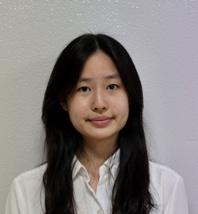
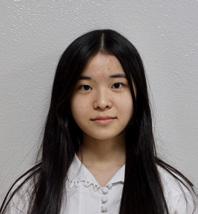


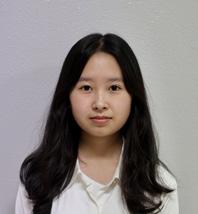
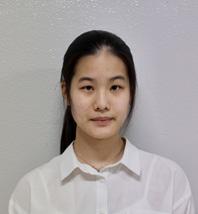
Yuzine Yi, Eunice Rhee
Photo Editors
Alice Lee, Chloe Cho
Copy
Sean Kim, Ellen Park, Jiyu Hong, Lin Chi ang, Jason Lee, Lucy Jang, Charlotte Jun, Jennie Koh, Kris Son, Sophie Choi
Layout Photo
Edward Yoon, Kaylee Kim, Ellen Ryu, Luna Moon, Silvia Lee, Hannah Kim
Julie Koh, Dana Chung, Kristina Kang, Bel la Youm, Celine Yang, Jasmine Cho, Anna Lee
Advisor
Ms. Wendy Grant
LETTER FROM THE EICs
Honorable delegates, chairs, advisers, and guests,
We are honored to serve as the editors of Seoulite, the official press publication of SEOMUN. We would like to celebrate delegates and chairs for attempting to tackle the most urgent issues in an ever complicating world and organizers for creating the space necessary to do so. Though SEOMUN may merely enact the events of a UN conference, it sparks the same dedication for making the world a better place.
This year’s theme, Bonds of Unity, says—whether through globalization, the Internet, or even common interests—that we are more connected to others than what we may usually think.
Journalism has been one of the most pervasive ways of reminding us of this shared humanity. For the last three years, Seoulite has brought together delegates separated by the pandemic and combined their stories on the same page. We hope that, with the four issues Seoulite will publish throughout the conference, we will once again remind you that even separated by im mense distances, all delegates share the same zeal for the betterment of the world.
We would like to ask the delegates and chairs for two things:
First, please take the time to look through our daily issues on issuu.com. We promise to fill its pages with diverse and engaging content ranging from debates being passed in GA I to which songs best represent SEOMUN.
Second, if a press member approaches you for an interview, please spare a few minutes. We will try our best to request a non-invasive time, but on rare occasions that might not be possible. We welcome your uncensored and personal opinions!
We wish all delegates the best of luck. Happy SEOMUN XXV!
Aimee Choi & Rosa Suh Co-Editors-in-Chief

JUKEBOX JEWELS
The highly awaited first day of SEOMUN has come to an end, and all del egates and chairs should reward themselves with pats on their backs for pushing through today’s arduous journey, while mentally preparing themselves for the next two days of more writing, debating, and resolving. Though MUN participants may get lost in the chaotic and time-pressuring environment of SEOMUN, it is crucial to never forget the main objective of reaching global social peace through unity. As this year’s SEOMUN theme: Bonds of Unity highlights, connecting with people worldwide is more im portant than ever, and delegates must strive to adventure beyond physical barriers to reach unified resolutions. As said by Je Young Yoo, the Secretary of General Assembly, “Within the modern day, we’ve come to recognize how, if we desire to solve any problem in today’s world, we must also try to solve all others.”
“Where Is the Love?” Black Eyed Peas

This early 2000s hip hop song contains lyrics advocating for global peace, women’s reproductive rights, racial equality, and more. The song’s warm-hearted and genuine lyrics reflect MUN delegates’ diligent efforts to reach resolutions that promote a unified, global effort to create a world of equality and peace. Just like how Black Eyed Peas expressed their support for unity through song, MUN delegates debate to advo cate for humanity’s unity and harmony.

“We’re All in This Together”
Matthew Gerrard & Robbie Nevil
Matthew Gerrard and Robbie Nevil hum a melody of encouragement through their song, “We’re All in This Together,” urging individuals to unite regardless of their dissimilarities and celebrate the existence of one anoth er. Anant Agarwal, delegate of UK from the Security Council committee, states that “delegates oftentimes get so lost in their debates that they forget that the end goal of the conference is to attain peace. Looking into the theme and learning about its true meaning allowed me to find joy in debating respectfully and fruitfully at this conference.” As mentioned by Anant, a harmonious society can only be reached through the unity of humanity, and this year’s SEOMUN strives to achieve just that.

“Stand Up” Cynthia Erivo
“Stand Up” by Cynthia Erivo advocates for the coming together of global activists to build a force against the evils of society. SEOMUN XXV brings the hopes posed by this song to reality, with passionate individuals from diverse backgrounds uniting to resolve global disputes to ameliorate the state of world politics. With this song, Seoulite hopes that delegates feel motivat ed to continue to search for effective solutions to the flaws of community.
4
Written by Chelsea Kim and Lauren Kim
Layout by Hannah Kim
STUFF DELEGATES SAY

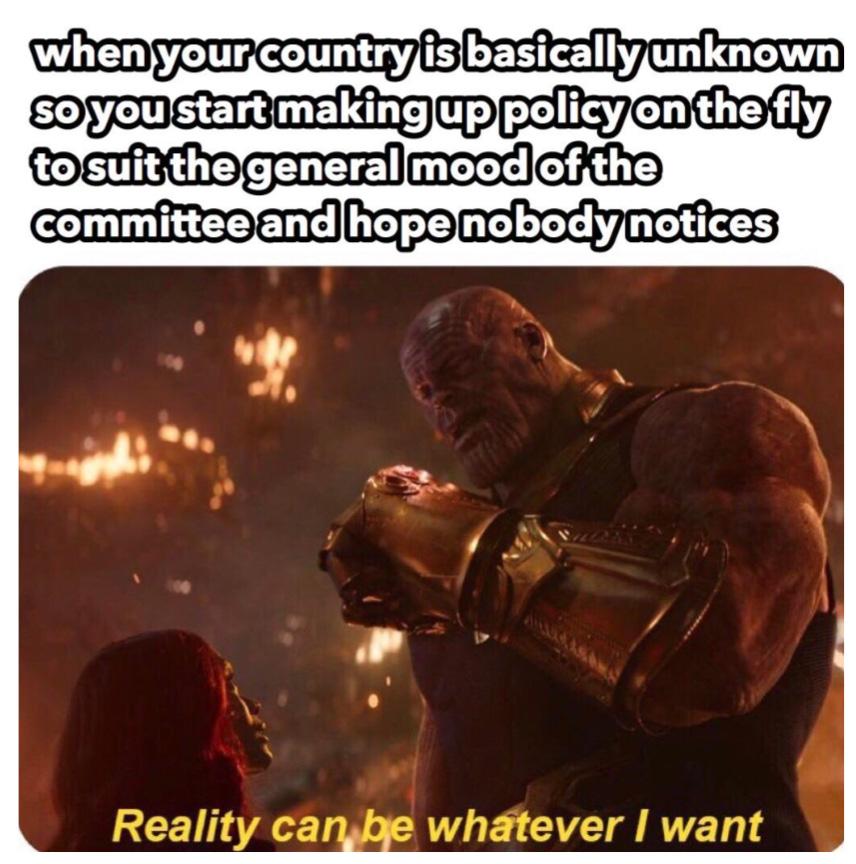
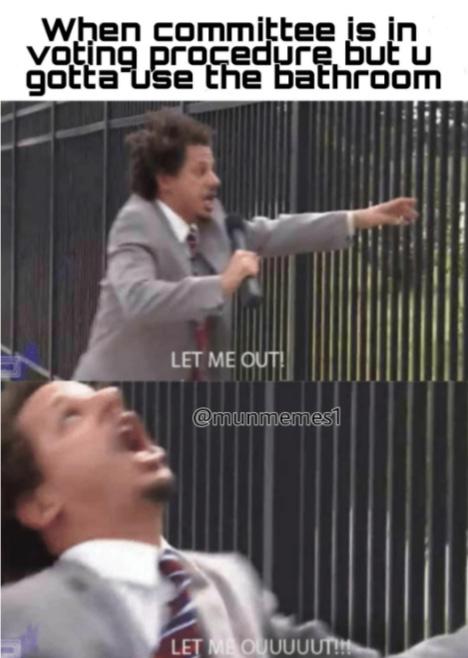

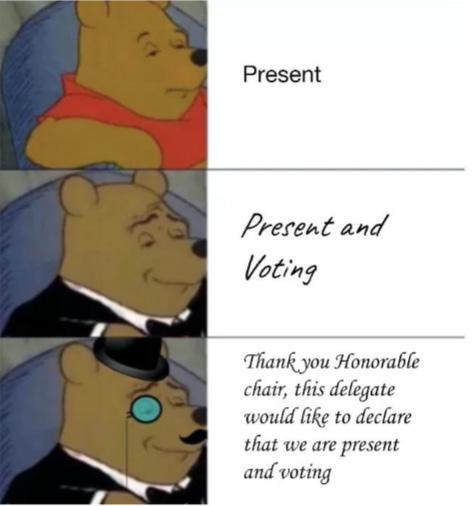
5
Written by Clair Kang and Grace Lee
Layout by Hannah Kim
GA HIGHLIGHTS GLOBAL COOPERATIVE RELATIONSHIPS
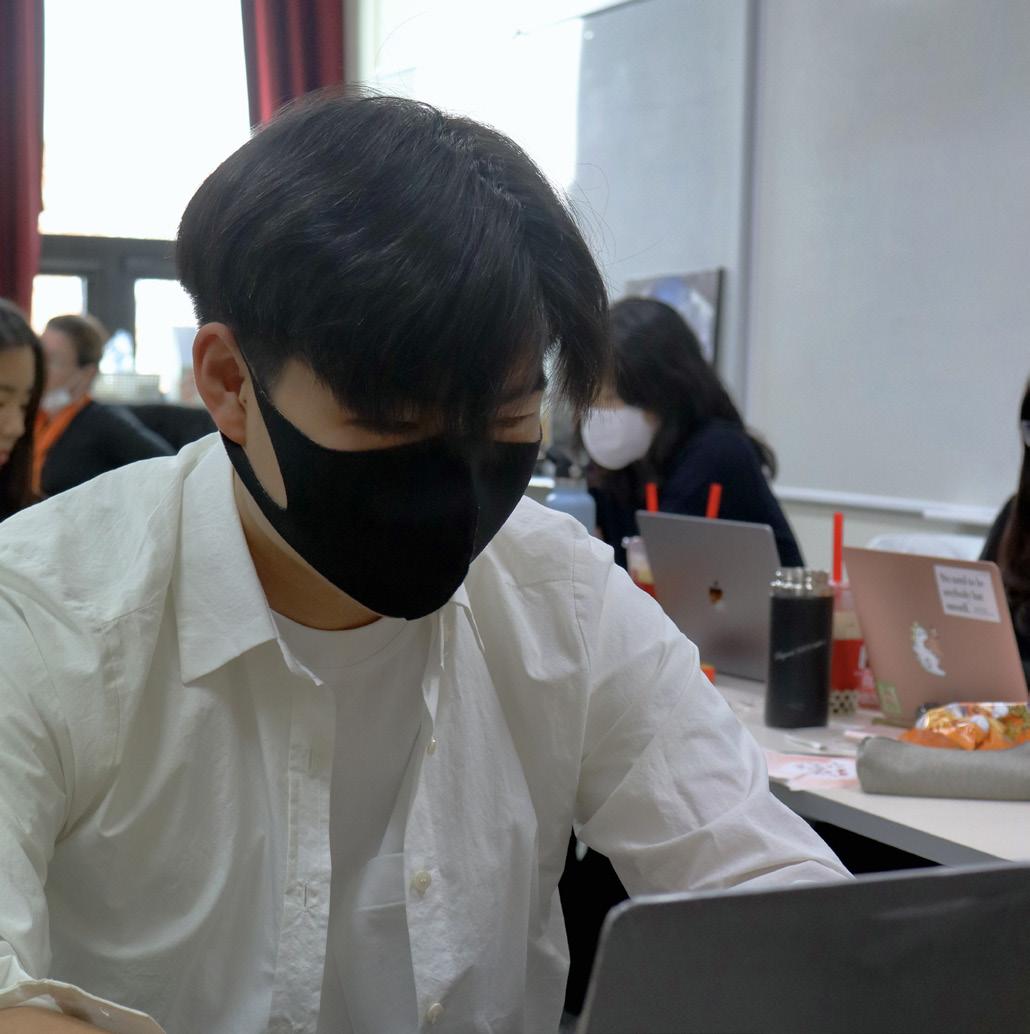
On the first day of SEOMUN XXV, delegates of the General Assembly (GA) engaged in an ac tive debate regarding the matter of ensuring in ternational peace and security in cyberspace. The first operative clause was proposed by the delegate of Argentina to urge the Global Cyberspace Secu rity Committee to facilitate cooperation among nations by including more economically devel oped countries and less economically developed countries. This proposal could provide the oppor tunity for countries to create innovative ways to combat cyberattacks and promote cyber security.
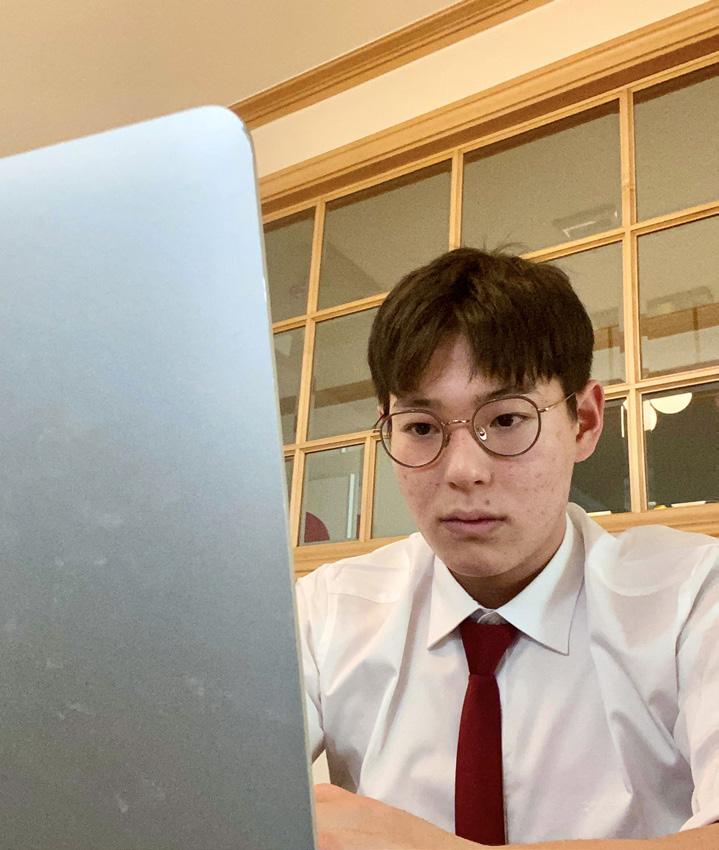
“I think operative clause one is effective because it asks for global communication,” said Danny Han, del egate of Argentina. “Because cyberspace is so large and hard to track, global communication and support are necessary. Also, unified solutions are necessary to combat international cyber threats, which makes com munication among nations so much more important.”
Enhancing current cyber technologies was also argued to be important, as countries with outdated technology remain far behind other nations in inno vation and science. Better cybersecurity innovations would be able to prevent cyber threats by utilizing computer sensors and numerous data networks. However, to facilitate technological advancements in less developed countries, support from other coun tries is necessary, as it is important to sup port equal access to technol ogy for coun tries that may not be
able to otherwise afford such costly measures. Other delegates agreed with the importance of staying up-to-date with modern technology.
“With the rise of increasing ubiquity and depen dence on technology, the issue of cyberattacks has become a pressing and urgent issue to resolve,” said Caitin Laddaran Chua, delegate of Italy. “We worked together as a committee with this in mind, and have split our op erative clauses up so that they tar get international cooperation, the advancement of current cyber security technologies, and raising awareness on the importance of educating a knowledgeable cybersecu rity force, to name a few.”
The importance of mu tual relationships between countries was once again emphasized in the clause promoting transparent in formation sharing between countries. For example, specific experts or professionals related to cybersecurity sectors could be further investigated, as well as keeping a close eye on breaches of government cybersecurity. Also, shared databases containing information about previous instances of cyberattacks were seen as effective in facilitating honest communication between nations.
“I think we can recommend member nations to co operate to mandate random checkups to ensure that the resources aren’t being utilized for other purposes,” said Michelle Bok, delegate of Germany. “Transparency is key in order to maintain peace and security in cyber space, and countries need to build trust in each other and come to a consensus about shared information.”
6
Written by Sophie Yejin Choi
Photo by Anna Lee Layout by Silvia Lee
ECOSOC AIMS TO IMPROVE FEMALE EMPLOYMENT AND POLITICAL PARTICIPATION
On the first day of SEOMUN XXV, delegates of the Economic and Social Council (ECOSOC) debat ed on the issue of broadening the scope of wom en’s participation in the workplace and politics. Ac knowledging that working women often face many difficulties when furthering their careers, a system on supporting these individuals and closing the wage gap between women and men was proposed.
“There is definitely gender inequality regarding [female employment and political participation], and women are not regarded on the same level as men in general,” said Sahngwon Lee, President of ECOSOC. “Implementing a system to support women trying to pursue a career is definitely a good idea, but it is also vital to prioritize women stuck in cycles of poverty because women from developed countries or well-off families tend to have more opportunities than others.”
The delegates also focused on the importance of tackling this issue from a legal perspective, not ing that urging nations to strengthen their legal frameworks related to women’s rights would lead to increased support for gender equality move ments. Strengthening laws would also allow wom en to receive the same pay as men and face less discrimination in the workplace, giving women the agency to improve their socioeconomic situations.
“Gender inequality has been a prolific problem within our society, including Turkey, the country I am representing,” said Philip Bliss, delegate of Turkey. “For problems like harassment, the wage gap, and gender quotas, many require laws to be enacted. Therefore, it is crucial to set certain laws for these specific issues, as it is an effective way to protect the basic rights of women.”
Other proposed solutions focused on promoting and collaborating with pre-existing Non-Governmen tal Organizations (NGOs) like the Pro Women Founda tion to give women the ability to gain more opportuni ties in various spheres such as education and politics. Being closely related to the lack of female participa tion in such spheres, organizations prove to be espe cially important to combat the social problems wom en often face, such as employment discrimination.
“Promoting pre-existing NGOs that address the


problem of female disempowerment is useful as col laborations with organizations like these are likely to benefit everyone as a whole,” said Jolie Nguyen, delegate of South Africa. “Everyone will benefit as collaboration with these organizations would lead to the improvement in women’s income security, especially in countries like South Africa where many households rely on women’s income to support them, this could help ameliorate poverty issues.”
The various solutions clearly demonstrate that im proving women’s employment and political partici pation is a serious issue that needs to be approached on a vast scale by each nation. Addressing this issue from a perspective that looks at a country from a wid er lens—that is, making edits to the legal framework and implementing viable sys tems to help women— appears to be necessary.
7
Written by Jennie Koh
Photo by Anna Lee Layout by Silvia Lee
WHA CONSIDERS WAYS TO PROTECT REPRODUCTIVE RIGHTS
During SEOMUN XXV, the delegates of the World Health Assembly (WHA) joined to discuss ways to effectively protect reproductive rights and improve universal access to reproduc tive healthcare services. The delegates focused on tackling multiple aspects of the issue, in cluding the creation of more organizations and agencies that could promote and protect repro ductive rights.
“Promoting the creation of organizations that specifically focus on protecting reproductive rights is important as the organization could resolve a lot of the issues regarding accessibili ty and education,” said Phillip Yoon, delegate of Columbia. “The organizations would essentially be a method of analyzing each member nation’s needs and wants regarding the reproductive products or fundings, and with an established standard, the organizations can provide the na tions with supplies.”
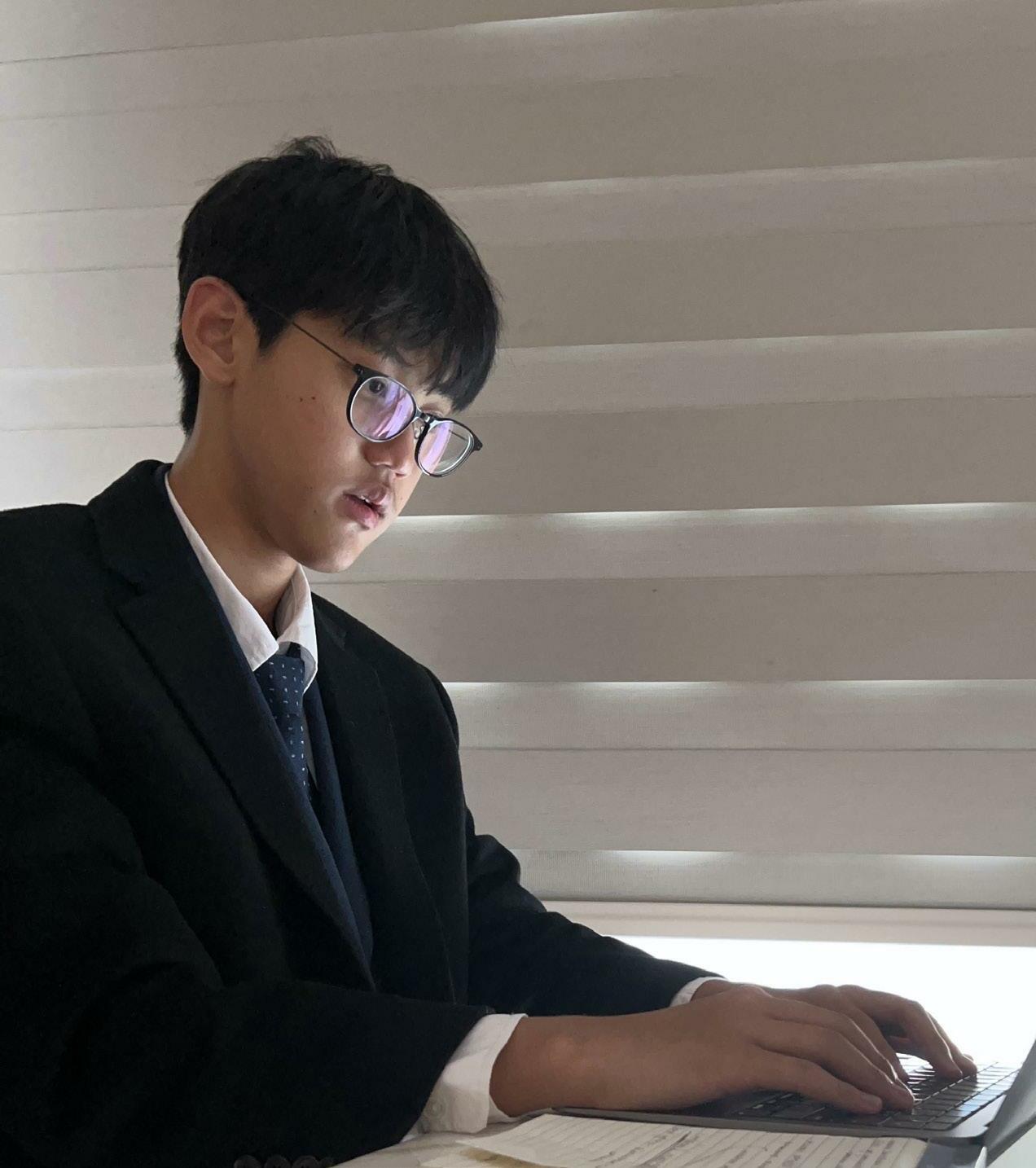
There was a focus on having nations promote reproductive education into their basic educa tional programs, allowing individuals to develop their understanding of reproductive health. This includes providing written and visual instruc tions on proper hygiene practices and introduc ing required lectures on the protection of repro ductive rights.
Not only would these mea
sures encourage enhanced awareness of sex ed ucation in both public and private schools, but they would also allow people to improve their physical and emotional relationships.
“Reproductive education should be promot ed due to the prejudices present against wom en, such as social and gender norms,” said Lillian Su, delegate of Philippines. “[Social and gender norms] have been enforced upon women in so ciety which ensued the lack of gender egalitar ianism and reproductive health improvement and rights. [However], all women have the right to be accessible to reproductive rights.”
Other delegates, while acknowledging the importance of raising awareness on reproduc tive rights and educating the general public, concentrated on ensuring the reproductive rights and safety of women, proposing specific solutions regarding gender-based violence. Cre ating a safe environment for victims to reach out for help through developing public reports, help centers, hotlines, and platforms would lead to an increase in approaching the issue of reproduc tive rights.
“It is important to improve reproductive healthcare services through raising awareness on the topic and creating new organizations that specifically focus on these issues,” said Haven Cha, delegate of Argentina. “However, treating victims of gender-based violence, particularly focusing on preventing gender-based violence and giving women bodily autonomy, should also take precedence since it can help reduce unwanted pregnancies and allow more women to pursue employment and other activities.”
Overall, determining the different ways to ef fectively improve healthcare services and pro tect reproductive rights involves a wide range of considerations, from those on education to violence. Addressing this issue from a perspec tive that looks at a country as a whole—that is, making edits to the legal framework and im plementing viable systems to help wom en—appear to be some of the most efficient and effective ways to protect reproductive rights.
8
Written by Jennie Koh
Photo by Jasmine Cho Layout by Ellen Ryu
UNHCR EVALUATES AFGHAN
REFUGEE’S ASYLUM
On the first day of SEOMUN XXV, the United Nations High Commissioner on Refugees (UNHCR) car ried out prolific debates on the integration of Afghan refugees and the Syrian refugee crisis. The safety and well-being of these refugees were critical to ensure, especially considering the casualties and mass migra tion resulting from the recent Russo-Ukrainian war.
Delegates discussed the need to propose solu tions for countries that lacked financial aid to host refugees, including Pakistan and Iran, and considered how to execute concrete policies to relieve refugees from experiencing further atrocities.
“I found out that a lot of the countries hosting Af ghan refugees, such as Pakistan and Iran, do not have the financial aid required to help refugees,” said Eddie Chu, the delegate of Germany. “Because of the lack of proper infrastructure, many Afghan refugees are liv ing in poor conditions. Therefore, our solutions center around providing citizenship to these refugees, im proving refugee camps, and providing incentives for medics to come or for economically developed coun tries to host refugees.”
The devastating situation Afghan refugees face re quires acute, yet philanthropic solutions. By commu nicating the humanitarian aspects of educating and allowing refugees to adjust to their host countries, the delegates sought effective solutions. Jian Hong, the delegate of Argentina, proposed a distinctive solution for the betterment of refugees: for econom ically stable countries to provide supplementary re sources for the refugees.
“As the delegate of Argentina, my stance is that large and more economically developed nations such as the U.S. should continue to take in more refugees,” Jian said. “Overall, the issues of health, safety, educa tion, and cultural preservation for refugees should be taken into account.”
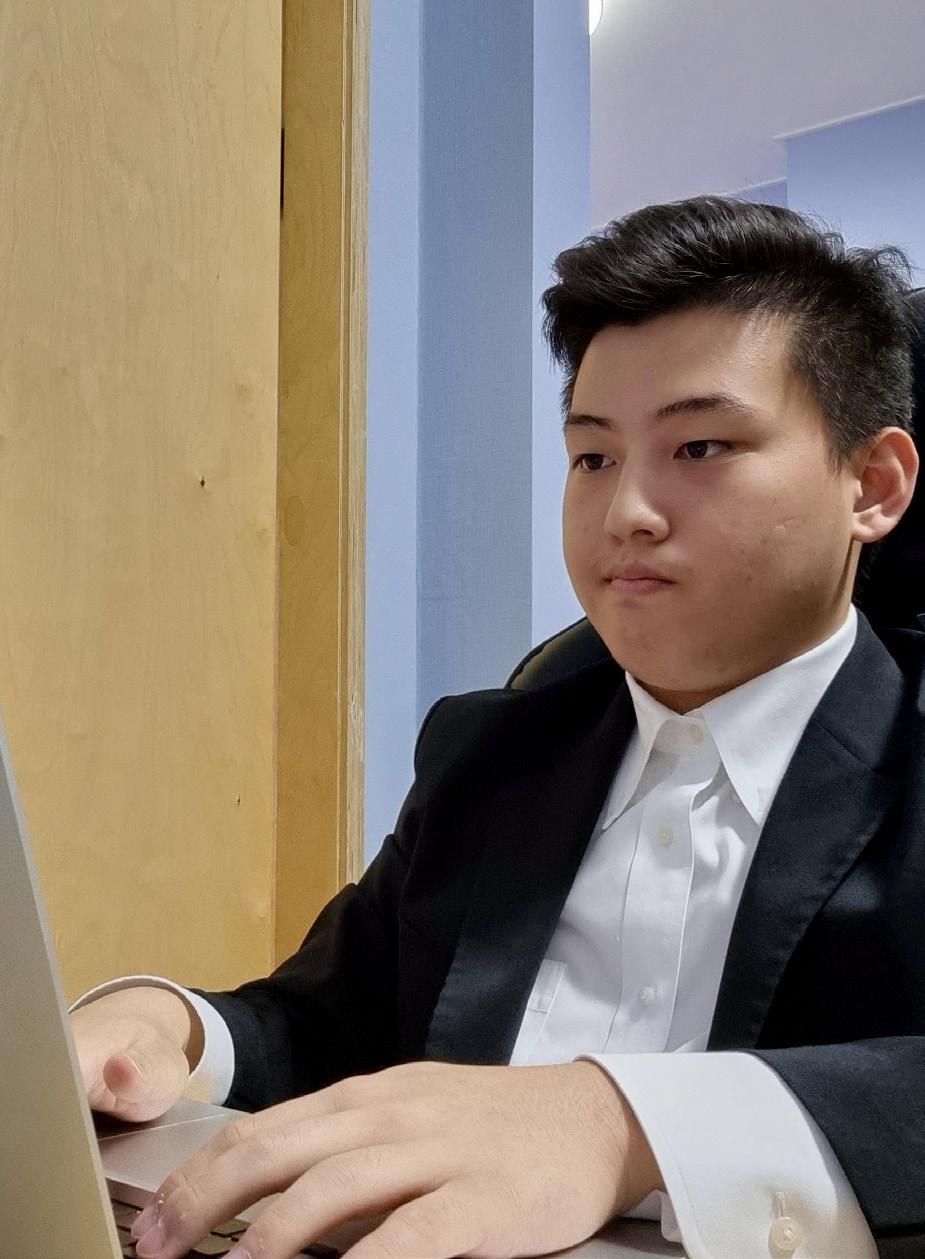
William Chung, the Assistant President, joined the
conversation on lifting refugee quotas for bills to pass through efficiently for the betterment of Afghan ref ugees. Offering a positive outlook toward improved circumstances for individuals, William stated that an increased number of non-governmental organiza tions was particularly beneficial.
“I believe nations should smoothly integrate Af ghan refugees by lifting refugee quotas and creating new bills,” William said. “I will continue supporting Af ghan refugee-related NGOs such as USAID, hopefully moving Afghani refugees to nations which await their arrival.”
9
Written by Charlotte Jun Photo by Jasmine Cho Layout by Ellen Ryu
DISCUSSIONS ON POLICE BRUTALITY IN HRC
In SEOMUN XXV, the Human Rights Council (HRC) began to discuss a variety of issues related to human rights. Delegates began by acknowledging the human rights issues connected to police brutality and recognized that the matter occurs often in both economically developed countries and less economically developed countries. There were negative and neutral attitudes towards the matter of police brutality which emphasized the importance and difficulty of this issue being solved.
“Israel, which is the country that I am representing, is one of the countries that have serious issues with the police being biased against minority groups,” said Minji Kim, the delegate of Israel. “Although I was put in an agenda with nations with moderate stances on the issue, there were a lot of differences in the stances of nations.”
Delegates of HRC were alarmed by the fact that certain nations currently do not have laws preventing police corruption and brutality, as well as being deeply disturbed at how numerous lawmakers and politicians were turning a blind eye to police brutality despite the rising levels of recent social unrest. In addition, delegates discussed police brutality’s connection to racial prejudice and discrimination, recognizing that police brutality-related cruelties have a deep and negative impact on the enjoyment of human rights. Delegates, therefore, required a united and comprehensive response from the international community.
“Some of the most important issues revolving around police brutality include the participation
of the government to fix the crux of the issue, and helping the people who were affected by it,” said Keanu Park, the delegate of the Republic of Turkey. “Rather than trying to limit police brutality, fixing the effects of it one by one would be essential.”
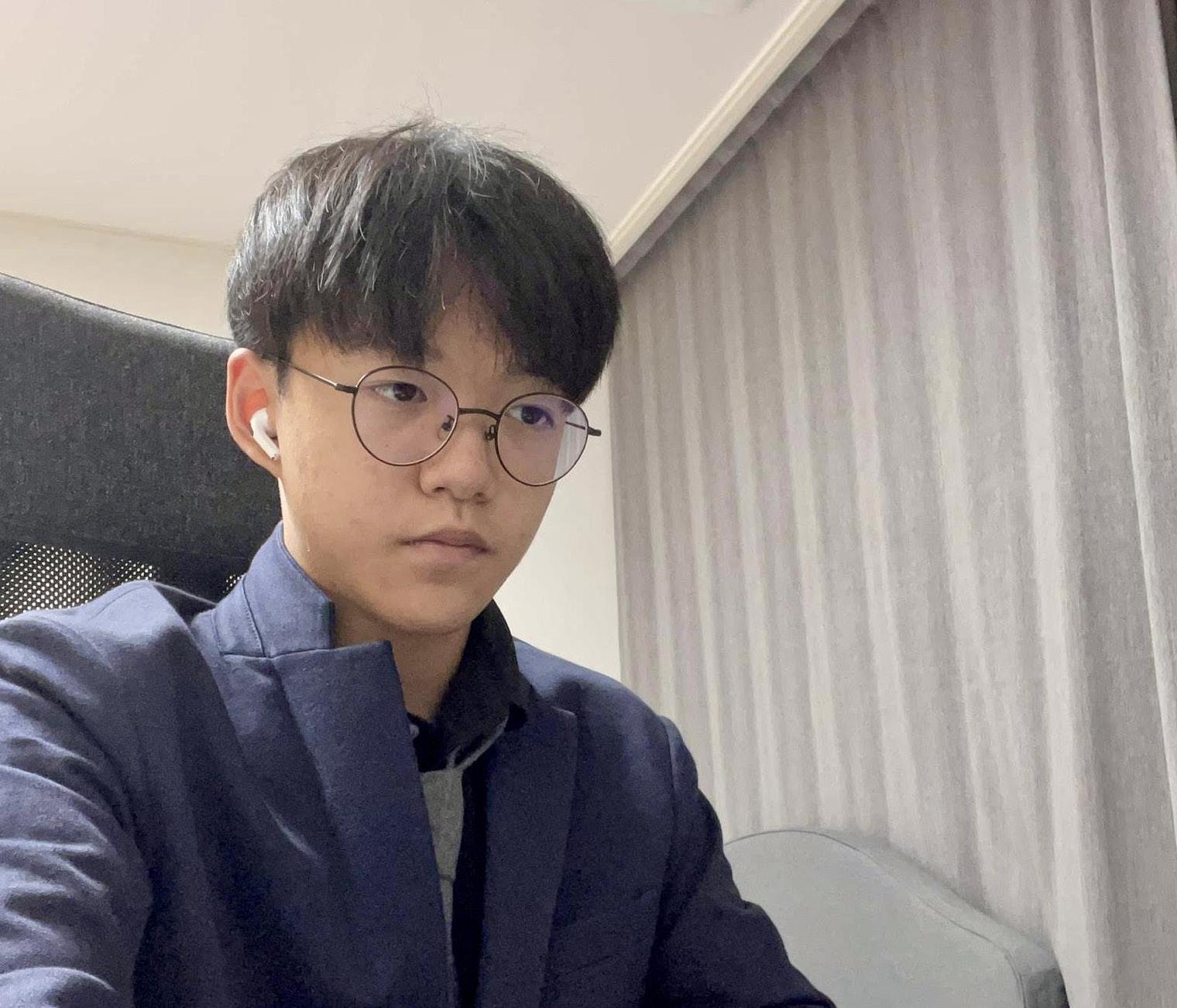
Near the end of the lobbying session, delegates from HRC believed that nations should work with the United Nations Police and the International Police Training Institute to issue reformation of police departments in member nations. Delegates also encouraged member nations to incorporate psychologists and mental health experts into police teams to promote the reform. At the end of the debate, delegates arrived at an agreement to encourage member nations to actively participate with UN mechanisms, bodies, and processes to preserve and analyze evidence of the most monumental international crimes and violations of law committed by the police.
“For this resolution, clauses related to raising awareness were important because many cases of police brutality are being deliberately covered up in the world today,” said Minji.“Because of Israel’s stance, the group tried their best to be as neutral as possible not to trigger potential violations of respective nations’ laws.”
10
Written by Lucy Jang
Photo by Celine Yang Layout by Kaylee Kim
SC ADDRESSES CORRUPTION IN THE LAKE CHAD BASIN
On the first day of SEOMUN XXV, delegates of the Security Council (SC) drafted a resolution ad dressing the human rights crisis in the Lake Chad Ba sin. Constant violations of human rights in this area and the lack of support from the UN were pressing issues that desperately needed to be addressed. The delegate of Israel proposed that greater transparency in the region of Lake Chad Basin was necessary to re duce corruption and censorship during times of war and hardship. Humanitarian aid, according to the del egate, must also be improved for people surrounding the area by providing more resources like food and medicine.
“For Lake Chad Basin, which is suffering from a vari ety of environmental, economic, and political issues, the most important solution is to provide immediate humanitarian aid,” said Hannah Choo, delegate of Co lumbia. “To prioritize the lives of the people on the ground without increasing instability, UN affiliates must collaborate. However, it is also crucial to address long term sustainability by implementing necessary clauses regarding gender equality or political trans parency.”
As the debate carried on, the delegate of Israel also promoted the protection of refugees by providing them with financial support provided by the United Nations High Commissioner for Refugees (UNHCR). This ensured access to healthcare for the refugees, giving them an environment of comfort to live and work in. Delegates agreed that refugee support is vital and that their human rights must be up held by the UN.
“I think operative clause three would be the most effective as a solution as it is essential for issues with refugees to be addressed,” said Jueun Kim, delegate of Israel. “One clause that might need improvement is operative clause two, as it does not make many changes to current humanitarian aid policies.”

In her proposals, Hannah focused on more longterm solutions that would ensure benefits for those living in the Lake Chad Basin. She proposed that gender equality should be promoted in these re gions so that education as a whole would increase, and women would be given more opportunities. This change could be made by conducting more research and holding regular discussions to promote greater equality.
“In our report, we have a clause about refugees and one about upholding women’s rights,” said Anant Agarwal, delegate of the UK. “Although these clauses may be overlooked and considered insignificant, they are vital in upholding Lake Chad’s sovereignty. Peo ple are what create a nation, and so in order to have a peaceful nation, the people must be content.”
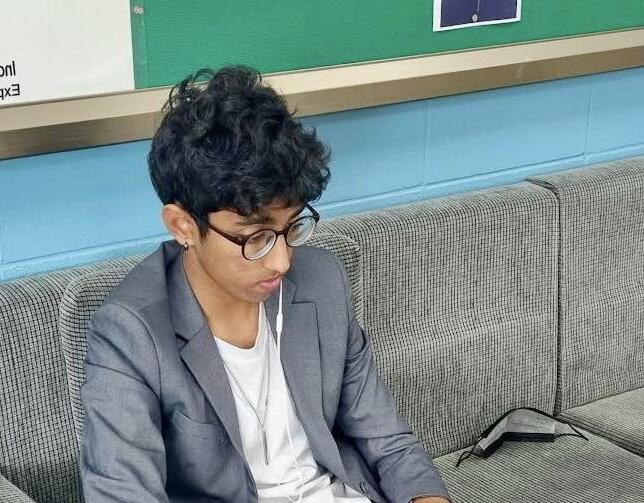
11
Written by Sophie Yejin Choi
Photo by Celine Yang Layout by Kaylee Kim
THE IMPOSSIBILITY OF FREE SPEECH ON SOCIAL MEDIA
As social media becomes increasingly influen tial in inspiring people from around the globe to voice their opinions online, a wave of inappro priate and sometimes overtly harmful content has followed. In response to this issue, social media companies have begun moderating speech that they deem “potentially harmful.” Notably, Donald J. Trump, former president of the United States, was banned on Twitter on Jan. 8, 2021 for spread ing misinformation. This exemplified the massive power of censorship vested within certain actors. While censorship on social media is effective in providing a safe space for constructive discourse, it has unintentionally reignited a fiery debate on whether limiting freedom of speech is justifiable and whether this power is more harmful than beneficial.
Censorship provides necessary measures to combat disinformation online—a problem that is especially detrimental on social media platforms that are prone to fostering echo chambers. These echo chambers usually conduce the amplification of radical, extremist ideas as participants receive only one source of information and ideology they believe to be true from their peers. This concept was exemplified in the Capitol Insurrection on Jan. 6, 2020, as Trump and his radical followers used platforms like Twitter and Facebook to spread false information regarding the legitimacy of the 2020 presidential election. This then sparked Trump’s followers to raid the US Capitol, mark ing a deep ly violent attack on American democracy as a result of the former president’s exploita tion of his freedom of speech. In
order to prevent such disasters from recurring, a certain level of censorship is necessary to counter disinformation on social media services as there are currently not enough alternative checks and balances in place.
On the other hand, censorship on social media paves the way for the destruction of discourse. A prime example of the downsides of the restric tion of free speech, particularly on social media services, is China’s destruction of pro-democracy sentiment and dissent. For example, China strict ly prohibited any discourse about the Tianan men Square Massacre on June 4, 1989. This pro hibition is particularly apparent on social media services like Weibo, as any user who mentions the Tiananmen Square Massacre is banned im mediately. Despite already heavy-handed cen sorship, China’s censorship of the event reached another level this year on the event’s anniversary. Chinese live-streamer Li Jiaqi’s broadcast to over 50 million followers ended abruptly after he ate ice cream in the shape of a tank, and he stopped streaming or posting altogether to his tens of mil lions of followers. He would only publicly return a few months later in late September. Unsurprising ly, all reposts of Li eating the ice cream were taken down by the Chinese government, highlighting the lengths to which censorship can be exploit ed by oppressive actors to create an environment that does not allow constructive discussions.
The issue of regulating free speech on social media is one with great political implications for individuals around the world. The power to cen sor social media platforms may be seen as neces sary to prevent massive disinformation schemes and the fostering of extremist ideologies, but the actor that holds such power is not always trust worthy. On a global scale, whether it comes to in dividuals who consume false information through what they see on Facebook, or to citizens in Chi na pursuing the freedom of speech, the power of censorship is one that has become increasingly contentious in the new age of social media.
Written by Jason Lee Layout by Eunice Rhee
12
HOW SOCIAL MEDIA CAN MINIMIZE POLITICAL EXTREMISM AND POLARISM
F or many, checking social media has become a crucial part of daily routine. When utilizing platforms like Facebook, Twitter, and Instagram, users often assume that the posts they see are raw reflections of another person’s life. According to Benedict Carey, an American journalist who focuses on science topics for the New York Times, there is “a psychology behind social media platforms” which make them “powerful vectors of misinformation” that can control the mind of the public.
Social media’s effect on the public is subtle. However, the January 6 attack on the US Capitol highlighted the critical problem of extreme polarization caused by social media. Although opponents argue that social media does not lead to significantly harmful consequences, there is an increasing body of evidence displaying that social media platforms directly contribute to polarization by encouraging extremism—which can lead to violent clashes.
It is clear that there is a relationship between social media platforms and extreme polarization, which is defined as the divergence of political attitudes toward ideological extremes. Consequently, the question arises: what is the most effective way to minimize the political extremism caused by social networking services in the US?
The deregulation of social media platforms is an efficient method in minimizing political extremism and polarization. According to Elias Dinas, a professor of political science at Oxford University, points out that social media’s current regulatory practices actually contribute to polarization; therefore, another method like deregulating social media platforms could be a potential solution. But for social media platforms to be deregulated to minimize political extremism, some extent of censorship is necessary to prevent hateship or radical views that incite violence.
The deregulation of social media platforms is in line with the freedom of speech, as guaranteed by the First Amendment of the United States. With this solution implemented, companies would be banned from regulating all content on social media. The complete deregulation of
social media falls more in line with the original purpose of the Internet: providing users with an opportunity to share ideas openly. In addition, the users could argue openly when changes are necessary. A firm line that borders facts and fiction in social media platforms is necessary to stop the flow of misinformation that permeates most social media platforms.
However, the complete deregulation of social media could lead to greater polarization. Without regulation, false information would thrive on the social media platform, leading to the proliferation of extremism. Many experts in sociology point out that freedom of speech does not equate to truth. In an unregulated environment, it is challenging to find the truths, and this deception can often lead to violence and commitment to illegal acts. With the privilege of having the truths, it is highly possible that the users of social media could be in more significant divisions or polarization as there would be no specific examination of truths. At the current stage, however, further study is necessary for this solution to be implemented to determine how total deregulation would impact the internet.
By looking at the conflicts that the users encounter with social media, there is no definite solution that can be implemented to enhance social media platforms to minimize polarization and political extremism. For the users to enjoy a platform with a balance between facts and fiction, a balance between regulation and freedom should be considered.
13
Written by Kris Son
Layout by Eunice Rhee
HSC DISCUSSES ISRAEL-PALESTINE DISPUTES
On the first day of SEOMUN XXV, the History Security Council (HSC) fruitfully discussed the agenda at hand: the partition of Palestine in 1947. The delegates took into account the hostile relationship between Arabs and Jews in the newly-partitioned states of Palestine and Israel and made efforts to propose resolutions that would coherently adhere to the desired religious freedom and diplomatic union of both nations.
The discussion commenced with a resolution submitted by Jayden Choe, the delegate of the Islamic Republic of Iran. The resolution requested the formal evaluation of Israeli-Palestinian disputed borders in the International Court of Justice (ICJ) and further requested the formation of the Israeli-Palestine Bilateral Committee to guide the ICJ.
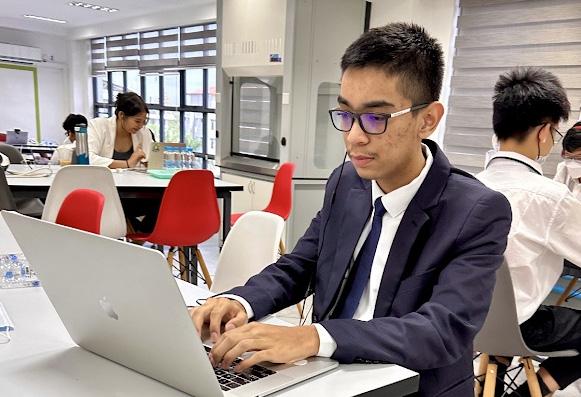
“I think my resolution was overall well-aimed and built upon previously ratified and mutually recognized treaties between government representatives,” Jayden said. “I hope to resolve territorial, property, and resource disputes while designating clear geographical boundaries between the nations.”
On the other hand, other delegates
focused on different agendas, such as the delegate of China, who proposed a resolution regarding the War On Terror in 2001, recommending stricter border control and government accountability to UN recognized terrorist organizations. This resolution received overwhelming support from other nations who had shared coherent ideas in resolving instances of physical harm on the border.
“My stance as the delegate of Saudi Arabia is a positive stance towards combatting terrorism, and I support the resolution submitted by the delegate of China,” said the delegate of Saudi Arabia. “I’m trying to create a resolution with my teammates that effectively combats terrorism while also preserving the safety of innocent civilians and the safety of nations.”
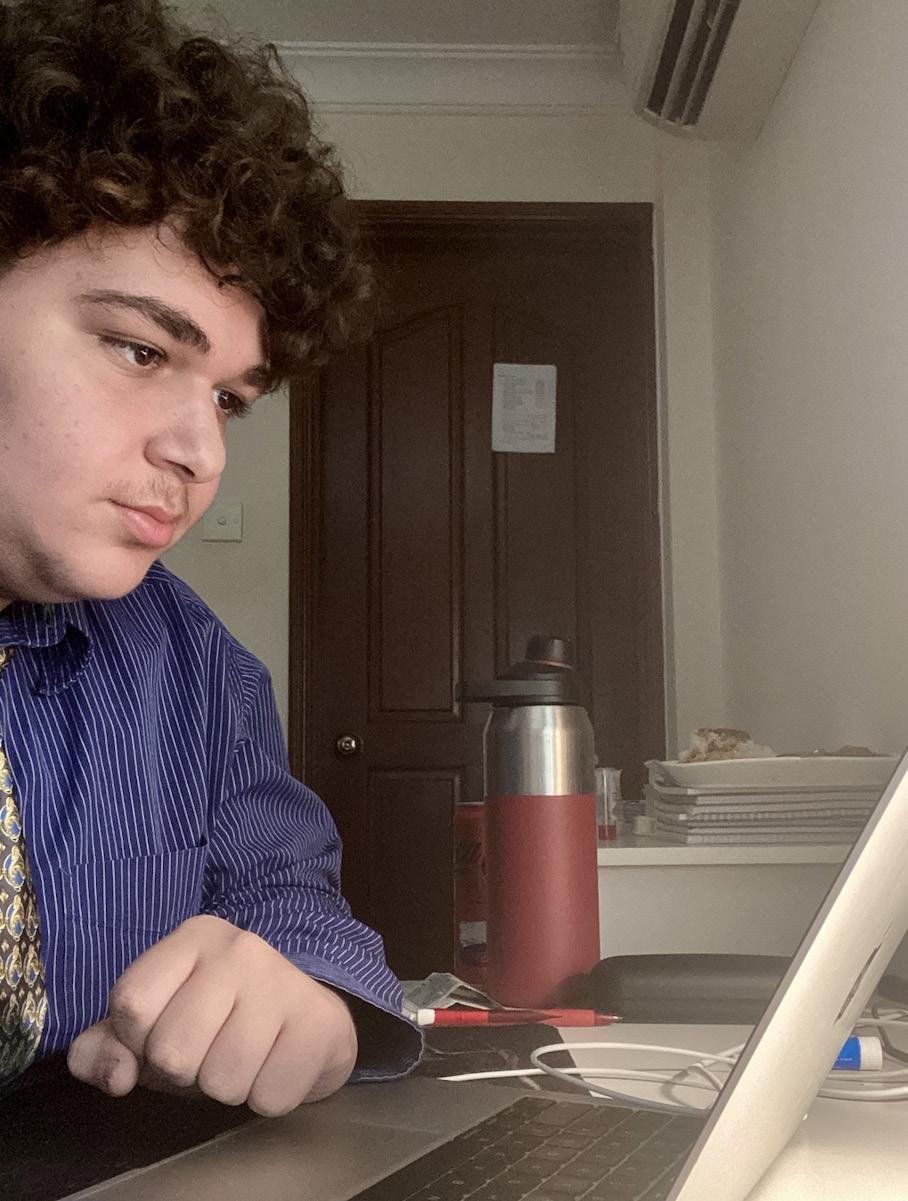
Nick Park, the delegate of Japan, agreed with the clauses listed in the resolution proposed by the delegate of China; however, the delegate believed the resolution lacked specific measures to preserve the goal of maintaining peace and recommended the addition of another clause.
“As for Japan, our stance is pretty similar to that of the other delegates, which is to eradicate all forms of terrorism,” Nick said. “However, I think it would be more effective if the UN could deploy peacekeeping operations and troops to assist government troops on the border.”
Overall, the first day of debates was a success, with an overwhelming majority agreeing with the resolution proposed by the delegate of China.
14
Written by Lin Chiang
Photo by Bella Youm Layout by Luna Moon
SPT DISCUSSES HOW TO RESOLVE TENSIONS BETWEEN NATIONS
With the commencement of SEOMUN XXV, delegates of the Six Party Talks (SPT) targeted growing economic and territorial issues among member states. Each delegate was divided into groups to support common goals of interest. All three agendas simultaneously focused on the topic of negotiating an end to the Korean War.
While Agenda 1 focused on the identification and resolvement of internal and external issues that plagued the North and South reunification effort, Agenda 2 was founded upon the issue of the economic and political conflicts between the Republic of Korea and Japan that were potentially stalling reunification efforts. Lastly, Agenda 3 focused on resolving territorial disputes through diplomatic means. Alexander Kameoka, the delegate of Japan, favored Agenda 2, supporting a much more tacit, peaceful approach.
“We can encourage North Korea to rejoin the SPT, thus facilitating denuclearization, and we can solve this issue of Japanese citizens being abducted by the North Korean government,” Alexander said. “This situation that we are currently in harms everyone involved, and the only way out is to try something we have not tried before such as incentives.”
Even delegates from different agendas within the committee were all in favor of diplomatic means to resolve tensions between member nations, whether that issue be territorial or economical. The delegate of Russia, Wannachi Suerte, was especially concerned about the growing territorial disputes with Japan.
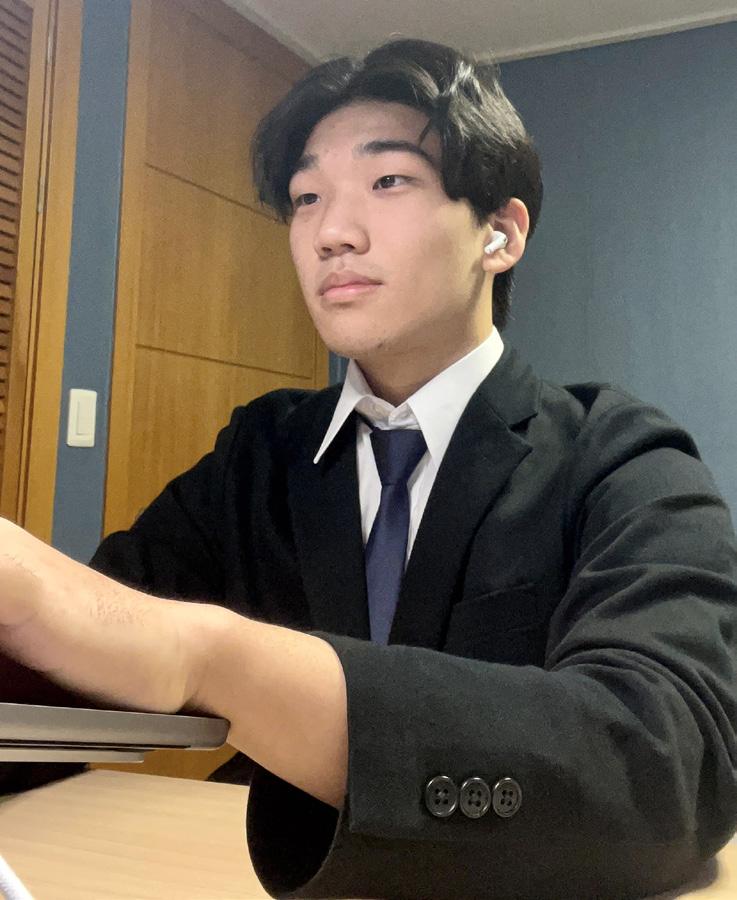
“I think that resolving territorial disputes is crucial in order to establish international stability. The Dokdo/ Tsushima Island conflict has repeatedly
resulted in diplomatic breakdowns due to the escalation of the issue,” Wannachi said. “For Russia in particular, with Sakhalin Island and the Kuril Islands being disputed with Japan, the delegate of Russia believes that de facto control over certain territories should be respected.”
The chairs, however, held a very different view of the Agendas. They believed that while cooperation between nations was necessary to achieve effective negotiations between the six nations, this process was too complicated due to the strong opinions held by each participating nation.
“Agenda 3 is not an easy agenda to reach a compromise on because there are stark differences in the stance of all six nations in the Six Party Talks on this contentious topic,” said Hyueneung Cho, the Deputy Assistant President. “In general, a lot of topics in SPT are hard to reach a compromise because they encourage extremely differing stances among the member nations.”
15
Written by Jiyu Hong
Photo by Bella Youm Layout by Luna Moon
CSW DISCUSSES SEXUAL WORKPLACE HARRASSMENT
On the first day of SEOMUN XXV, delegates from the Commission on the Status of Women (CSW) discussed women’s rights and empowerment. The debate began with the delegates’ opening speech es, most of them relating to sexual harrassment in workplaces. Delegates asserted that gender violence remains a worldwide problem that is largely ignored, especially in less developed countries. Many acknowl edged the difficulty of achieving equal education and the recent rise in protests for women’s rights.
“With gender discrimination being an ongoing problem, CSW is certainly an important committee for delegates to voice out their opinions on the mat ter and find innovative solutions,” said Daniel Shin, President of CSW. “I am very much looking forward to hearing from everyone in today’s conference.”
While some countries have strict laws against dis crimination, other countries sweep women’s rights under the rug. Throughout the debate, legal and po litical differences caused much friction between the methods each country proposed to combat discrim ination. Yeonjae Kim, the delegate of Germany, pro posed solutions for issues such as child marriages and
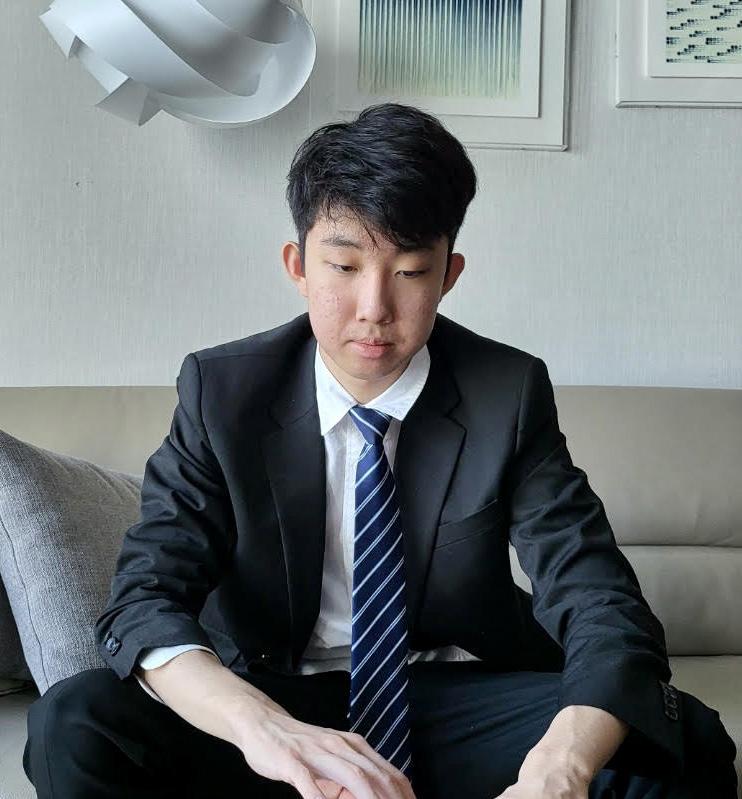
harassment by delving into detail the problems that women face because of those issues today.
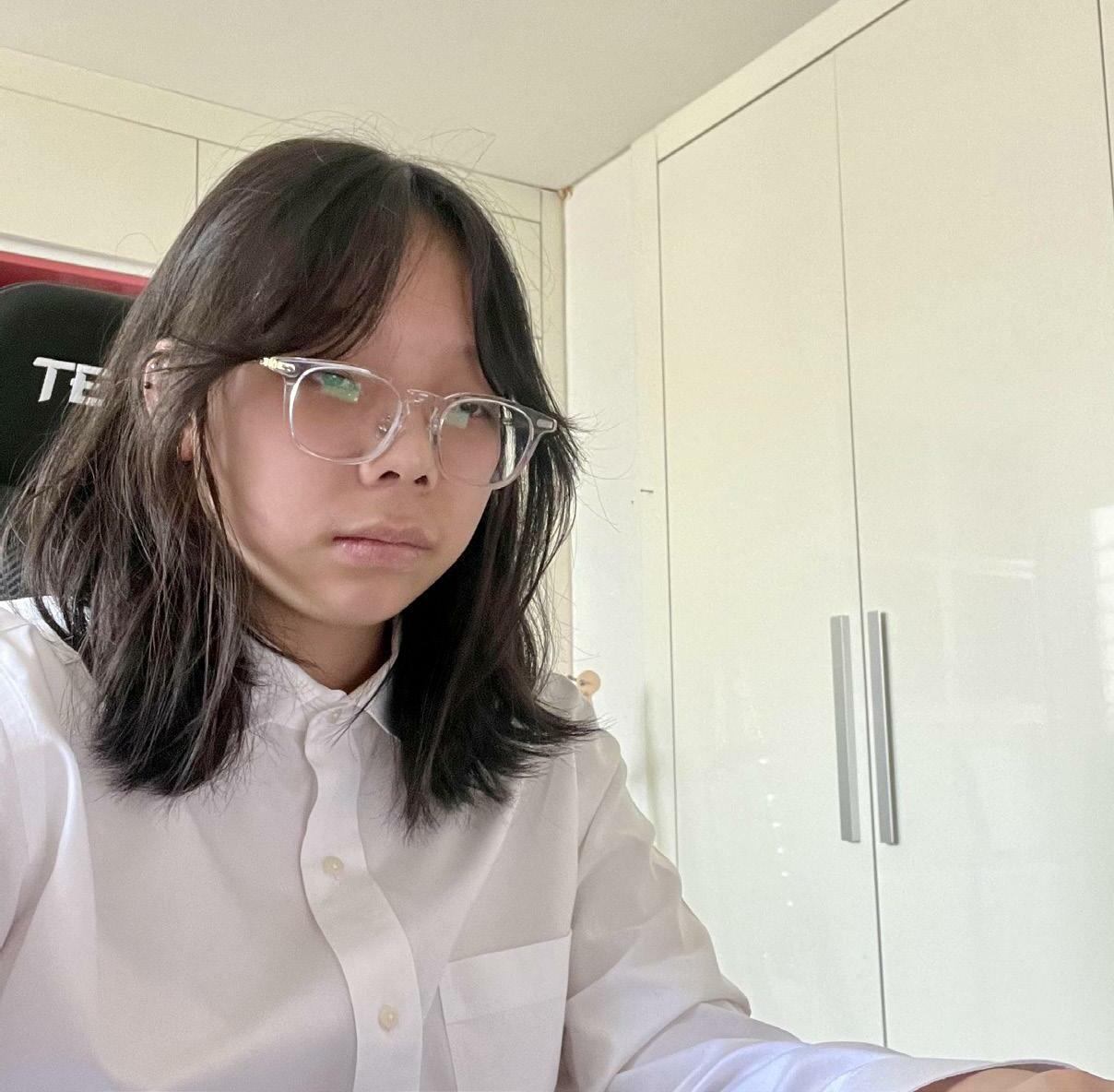
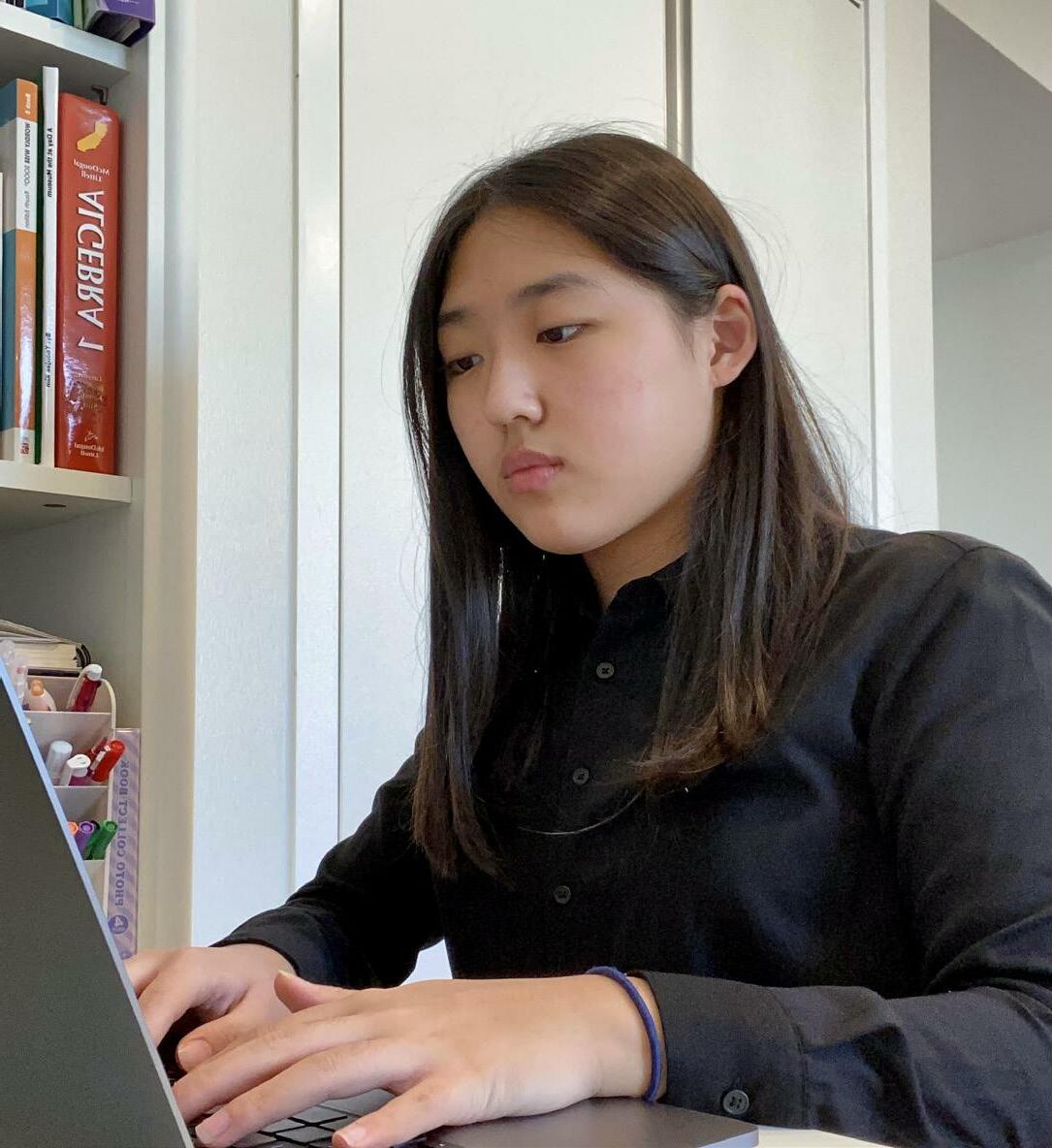
“The CSW is a very specific committee that focus es heavily on the importance of gender equality,” Yeonjae said. “It is an important committee because women currently face a serious array of issues ranging from sexual harrassment to child marriages.”
Throughout the debate, delegates engaged in ac tive discussion on ways to improve living conditions for women all around the world as well as discussing the different problems each country faces on the is sue. The delegates communicated and worked to gether to form a resolution that satisfied the needs of all of the countries involved in the debate.
“Throughout this time, I was able to learn a lot about the country Israel,” said Olivia Lee, delegate of Israel. “Women’s rights in Israel are well upheld and tight. Israel has several laws about gender discrimi nation in the workplace. It also has punishments for people who go against those laws. Israel definitely goes against gender discrimination and believes in equal rights for both men and women.”
16
Written by Ellen Park
Photo by Kristina Kang Layout by Edward Yoon
DELEGATES DEBATE HARD ABOUT TIME-CRUNCHING ENVIRONMENTAL ISSUES
During SEOMUN XXV, six delegates from the Envi ronmental Commission (ENV) agreed to create a resolution combating wildlife trafficking and other related crimes. Each country acknowledged certain facts, such as that 30,000 species are driven to extinc tion annually, as well as acknowledging that wildlife trafficking is a huge factor in mass extinction. The de bate started off calmly but with an urgent tone. Every country agreed that migrant workers deserve basic rights, but the extent and financial aid needed for mi grant workers was greatly debated.
“As a developing country, Iran has striven to foster partnerships with relevant organizations by increas ing the number of rangers around protected areas and adopting stricter regulations/laws for illegal poaching,” said Chloe Lee, the delegate of Iran. “With the scrutiny that this resolution has come under, I believe that it will end up effectively limiting illegal poaching.”
Similar to the delegate of Iran, other delegates emphasized creating a Convention on Internation al Trade in Endangered Species (CITES) subdivision focusing on monitoring illegal wildlife-related prod ucts online which would allow investigation teams to track down poachers’ network systems. The delegate of Saudi Arabia also wished to implement other mea sures to reduce wildlife crime.
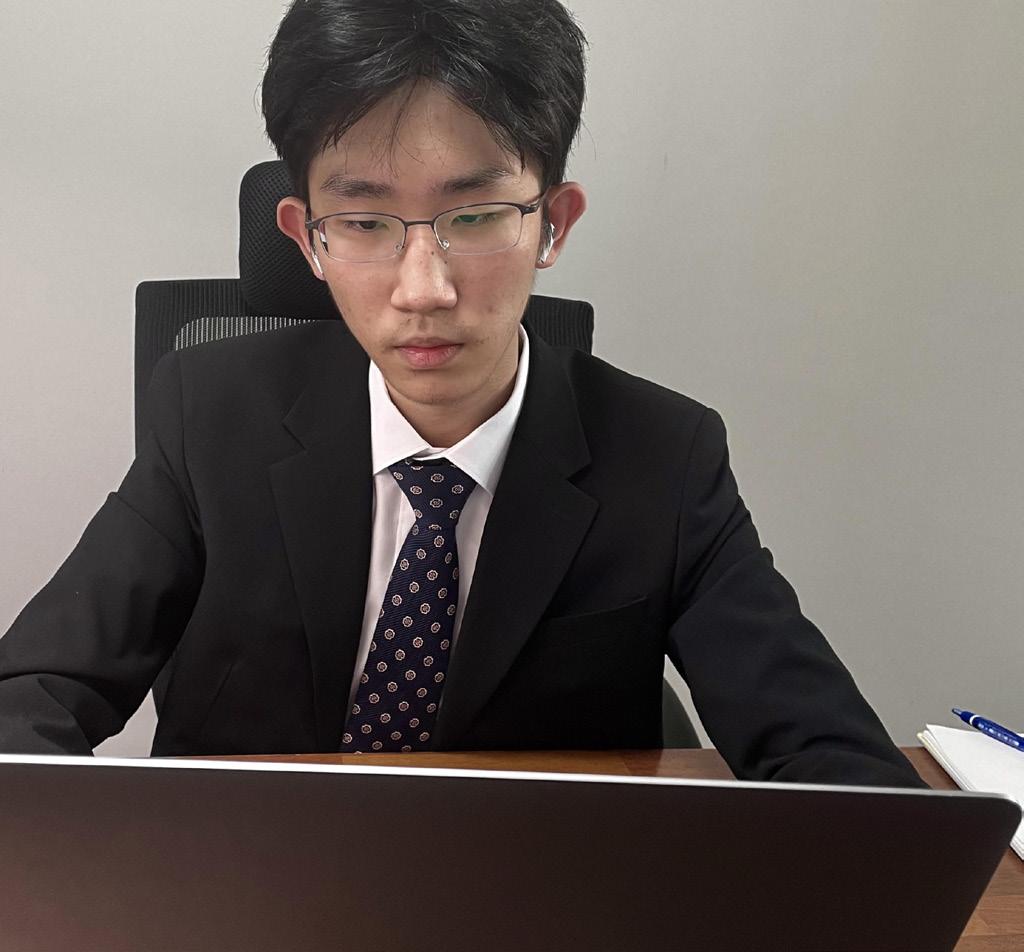
“The proposed resolution is based on implement ing different measures to help mitigate the contin uous wildlife trafficking problems,” said Emily Zhen, the delegate of Saudi Arabia. “I think this resolution
is effective because it is detailed and thoughtful re garding how delegates would potentially solve these pressing issues.”
Clauses that recommended relevant funding pro grams to fund wildlife protection centers were the most examined clauses because it required the coop eration of different funds and negotiations with local governments to preserve land subject to poachers’ harms. Alongside these environment-focused claus es, the delegate of Argentina actively participated in the debate about improving existing conventions for wildlife protection.
“Wildlife crime is a large threat to the wildlife of Ar gentina, and while Argentina has been making efforts to address the problem—as can be seen in Argentina’s participation in CITES and the UN Convention against transnational organized crime—there are still many areas Argentina can improve on when it comes to ad dressing wildlife crime,” said Carey Kim, the delegate of Argentina. “The delegate of Argentina believes the resolution is doing well in addressing all sides of the problem such as law enforcement and education.”
Overall, the resolution established that more aid is needed from organizations and networks such as The Wildlife Trade Monitoring Network to stop hunt ers from poaching in prohibited wildlife areas. It also aimed to hold companies accountable and ensure ba sic health insurance and minimum wage for workers.
17
Written by Sean Kim
Photo by Kristina Kang Layout by Edward Yoon
SPC ENSURES THE SAFETY OF ESSENTIAL MIGRANT
On the first day of SEOMUN XXV, the Special Con ference Committee (SPC) actively debated and drafted resolutions aiming to solve the exploitation of migrant workers and war destruction. As the open ing speeches were given and the floor was opened up for discussion, six delegates came together to debate and draft a resolution that answered compo nents of migrant workers’ struggles: the concern with global trends towards mass migration and associat ed increases in human rights abuses, acknowledging documented migrants’ rights to seek residence in any country, and recognizing that migrant workers shall enjoy equality of treatment. Delegates of Egypt, Ja pan, and Singapore, announced new regulations and fines that collectively led to a fruitful solution.
“Singapore, a country where one-third of the work ers are migrant workers, hopes that member states can debate producing a resolution that ensures the safety of the migrant workers in their destination country,” said Daniel Kim, the delegate of Singapore. “I also aim to ensure that migrant workers’ rights are re spected and not violated or exploited by companies and other human trafficking companies.”

Daniel implanted an agenda into the proposed res olution by forcing governments to keep transparen cy regarding the wages and working environment of migrant workers. The resolution included clauses that focused on holding companies responsible for any unworkable conditions or payment below the min imum wage by suspending the company for three days if these statistics were not satisfied. While Sin gapore emphasized equal pay for migrant workers, Egypt made sure that the resolution included a provi sion on basic insurance for workers.
“I strongly want and encourage countries to set mi grant workers’ health and security as a priority,” said
Seunga Son, the delegate of Egypt. “Also, Egypt sug gests close cooperation with Non-Governmental Or ganizations (NGOs) to protect migrant workers’ rights. Egypt wants to make sure migrant workers’ health is always being checked and that workers have insur ance.”
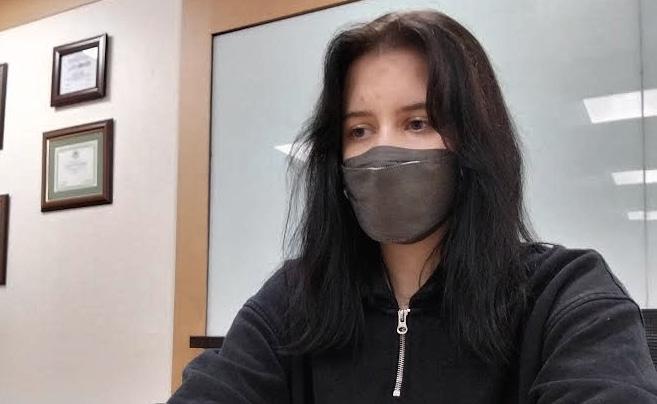
NGOs and healthcare companies such as the Red Cross and Doctors without Borders. The proposed resolution recognized these respective organizations and called for them to give migrant workers health insurance, promise workers discounts for health charges, and regularly check their health. While the resolution named organizations that could help with this mess, Japan wished to highlight the basic human rights of migrant workers and also recognize their im pact in being an imperative part of developed coun tries’ economies.
“My stance and aim for this resolution is to highlight not only the responsibility of developed countries to guarantee basic human rights and dignity of peo ple, but also the integration of migrant workers and how they have been an imperative part of developed countries’ economies.” said Chelsy Lee, the delegate of Japan. “Migrant workers have been a significant por tion of the labor force for a lot of countries and should be guaranteed equal rights and treatments.”
Overall, Resolution 1 acknowledges the harmo nious integration of migrant workers to be an im portant agenda of international communities while recognizing that migrant workers deserve workable conditions and basic human obligations such as healthcare, minimum wage salaries, and respect. They are essential in diversifying and enriching workforces around the world that are increasingly becoming old er and smaller.
Written by Sean Kim
Photo by Dana Chung Layout by Kaylee Kim
18
ICJ STRIVES TO FIND JUSTICE FOR MR. DIALLO
On the first day of SEOMUN XXV, judges in the International Court of Justice (ICJ) engaged in fruitful debates regarding cases of violence driven by injustice. The main focus was placed on the case of Republic of Guinea v. The Democratic Republic of the Congo (DRC)—otherwise known as the Ahmadou Sa dio Diallo case—as well as the different stances states have on the atrocities committed by Russia in Ukraine.
Concentrating heavily on the specific case and in dividuals, delegates made important assertions for sovereign rights to protect Mr. Diallo, a businessman of Guinean nationality, who was unjustly imprisoned despite being unarmed. Hyuna Kim, the Judge of Guinea, asserted Guinea’s responsibility to protect Mr. Diallo.

“Because of the distinct perspectives of Guinea and DRC, it is crucial to recognize my position as a judge for the side of Guinea,” Hyuna said. “Our stance is to protect the sovereign rights of Mr. Diallo, a business man currently coming under fire by the DRC for debt problems.”
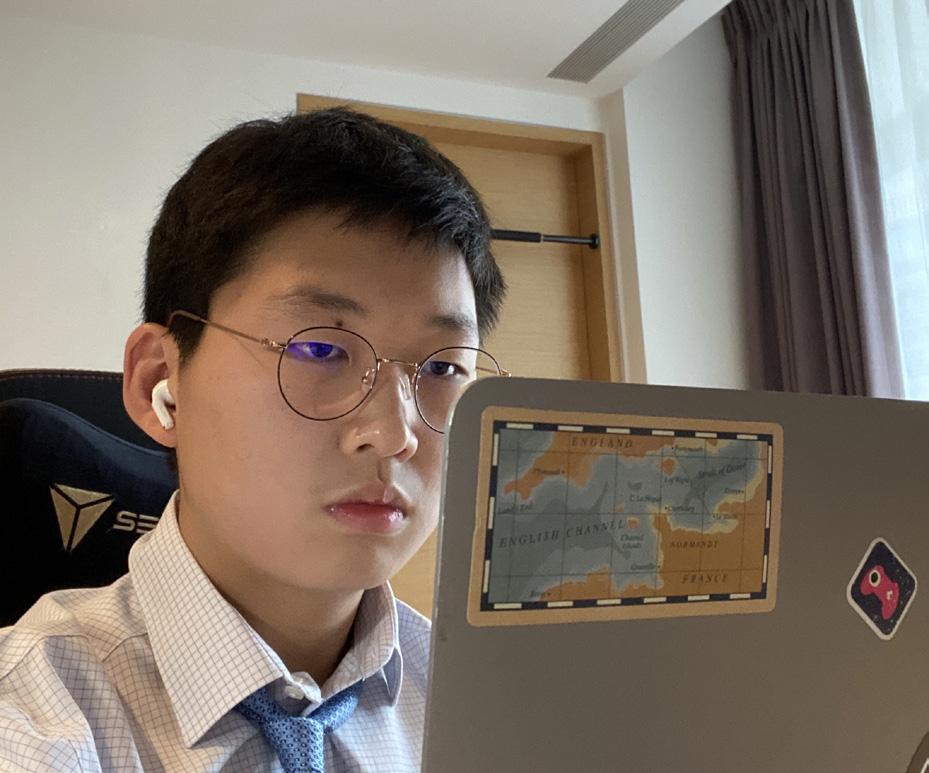
In contrast, So Jung Ohk, the Judge of Guinea, dis cussed that the DRC waiving judgments on debt set tlements by Diallo was the result of corruption among Congolese authorities and therefore does not stand in a judicial court. Thus, the DRC believed Dialo’s ex
“Guinea believes that the national state of DRC should not handle the diplomatic protection of the African-Zaire and Africontainers-Ziare, due to specific protection laws and instead should be tried in the Re public of Guinea, where he is a citizen,” So Jung said. “DRC cannot provide adequate diplomatic protection. Instead, Guinea should provide diplomatic protection for Mr. Diallo, as is the right for diplomatic immunity.”
Alongside the concerns revolving around protec tion laws, it is critical to realize the diplomatic fac tors in the case. Hyejoo Min, the Judge of DRC, took a stance against Guinea. The perspective of the DRC judges involved proving that Mr. Diallo had not ex hausted the means of debt retrieval nor local reme dies available for him in the country.
“Mr. Diallo cannot stand in as a substitute for the twocompanies (Africom-Zaire and Africontain ers-Zaire) because the exception to diplomatic pro tection cannot be applied in this situation,” Hyejoo said. “For such exceptions to be applied, there must be a complete attempt to exhaust local remedies available in the Congolese law for the alleged breach of those specific rights.”
pulsion from the DRC must be viewed as an encroach ment upon Diallo’s rights as a Guinean national and assocíe to this business, connecting to the fact that this was a sign of Congolese corruption.
19
Written by Charlotte Jun
Photo by Dana Chung Layout by Kaylee Kim
OPENING CEREMONY SIGNIFIES BONDS OF UNITY
The elevated tensions in the 25th iteration of the annual SEOMUN conference were alleviated by inspiring speeches by esteemed secretariats, advisors, and guest speakers. Amidst everyday encounters of uncertainties and challenges, the secretariat stressed the significance of this year’s SEOMUN theme, “Bonds of Unity,” in achieving international peace and security. Moreover, the opening speeches collectively exhibited an underlying appreciation for the devotion and commitment of the attendees to making the annual conference possible.
This year, unanticipated environmental and societal challenges rose and left nations in hectic circumstances; however, new alternatives arose to combat such tragedies and societies continued moving forward. Similarly, even when a global pandemic broke out three years ago, SEOMUN was still held successfully through the delegates’ collective efforts. The success of the preceding conference exemplified the essence of a “bond of unity” by exhibiting how working together toward one shared goal allows issues to be handled more efficiently. Grace An, Secretary General of SEOMUN XXV, explained the greater extent of this year’s theme in the real world.
“By uniting with one mind and one heart, we can work collectively and achieve global goals that better living standards and protect human rights,” Grace said. “Unity is not about reaching a uniform consensus, but the process of resolving a disagreement. With this definition in mind, I urge you to bond and unite with fellow delegates and chairs.”
However, despite the optimistic solutions that were enforced by individuals working together in a union, Mr. Federico Alberto Cuello Camilo, the ambassador of the Dominican Republic to the Republic of Korea, contextualized the reasons why the United Nations was not able to bring forth long-lasting changes in developing countries while also conveying the noteworthy role of MUN conferences to propose and debate solutions on ongoing humanitarian crises.
“The world we live in is facing unprecedented challenges, and unfortunately, the United Nations cannot do its work. It’s impossible in the face of catastrophic climate events and when certain countries do not respect their countries’ borders,” Mr. Camilo said. “We must find solutions of practical nature to the challenges facing our world and always be mindful that there is no planet B.”
On a final note, Katie Yoo, the Deputy Secretary General of SEOMUN XXV, reminded delegates of the overarching merits of SEOMUN, other than its academic merits, in making enduring memories with fellow delegates.
“In SEOMUN, no matter how big or small the committees are, I’d like to see bonds among delegates, chairs, countries, and most importantly, among fellow peers,” said Katie. “I say this because MUN is not all about resolving contemporary world issues; it is also about meeting peers of similar backgrounds and forming connections that could last a lot longer than you think.”
20
Written by Lin Chiang
Layout by Luna Moon
ACCOMPLISHMENTS PARTICIPANTS OF SEOMUN DESIRE TO ACHIEVE

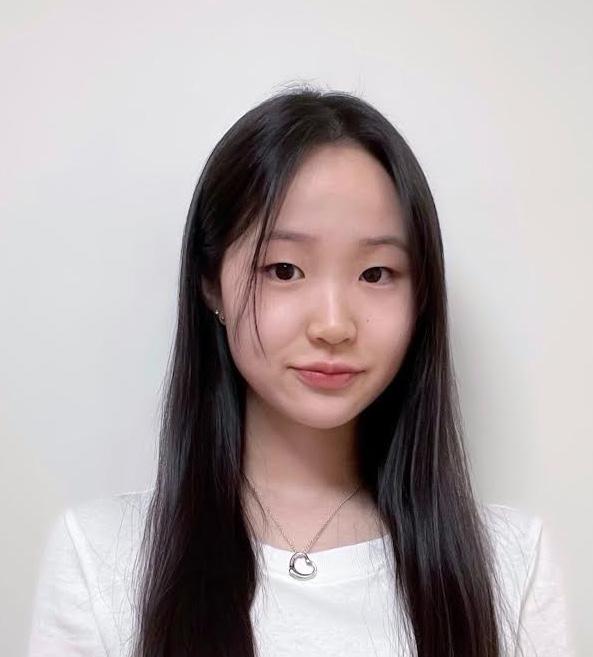
On November 11th, the first day of SEOMUN XXV took place online with a myriad of international schools participating, including SIS. Many delegates spent days preparing for this nerve-wracking event and constantly revised their resolution to make it best it could be. Many began MUN as a way to improve communication skills, and by the end of SEOMUN, they emerged as powerful communicators and strong debaters.
“One thing that I hope to achieve at this conference is to speak as much as possible! Even if I am not entirely sure, I have decided to make this conference a really valuable learning experience and aim to always speak and engage with others. Another goal I have is to communicate well with other delegates, as I would really like to socialize and continue to form lasting friendships.”
- Jian Hong, the delegate of Argentina of the United Nations High Commissioner
“By the end of this conference, I want to be more confident in speaking. Because you have to speak about your opinions on the spot very often during MUN debates, I hope to increase my experience with impromptu speeches and POIs so that I can eventually be able to speak with confidence in upcoming conferences. Also, I hope that I will just be able to leave the conference knowing I contributed a lot by speaking often and working hard on the resolution.”
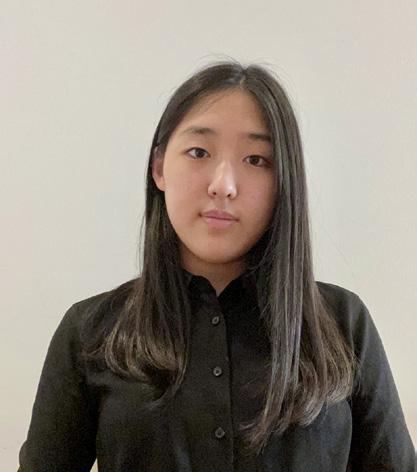
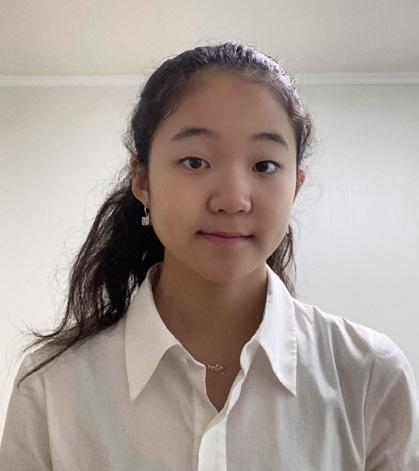
- Yeonjae Kim, the delegate of Germany of Commission on the Status of Women
“By the end of this SEOMUN conference, I hope to have at least one delegate tell me that this conference was fun. I really wish delegates leave with a positive impression of MUN. Having served as a chair for the Environmental Commission at SEOMUN last year too, I think I have developed a pretty significant personal connection to the committee itself. ”
- Katelyn Oh, President of the Environmental Commission
21
Written by Ellen Park
Photo by Julie Koh
Layout by Luna Moon
SEOULITE ISSUEXXV 1



































































